SPOILS OF THE KINGDOM
ANSON SHUPE
Spoils of the Kingdom
CLERGY MISCONDUCT AND RELIGIOUS COMMUNITY
Introduction by
A. W. RICHARD SIPE
UNIVERSITY OF ILLINOIS PRESS
URBANA AND CHICAGO
2007 by Anson Shupe
Introduction 2007 by the Board of Trustees of the University of Illinois
All rights reserved
Manufactured in the United States of America
C 5 4 3 2 1

This book is printed on acid-free paper.
Library of Congress Cataloging-in-Publication Data
Shupe, Anson D.
Spoils of the Kingdom : clergy misconduct and religious community / Anson Shupe ; introduction by
A. W. Richard Sipe.
p. cm.
Includes bibliographical references and index.
ISBN-13: 978-0-252-03159-5 (cloth : alk. paper)
ISBN-10: 0-252-03159-8 (cloth : alk. paper)
1. ClergyProfessional ethicsUnited StatesHistory.
2. CrimeReligious aspectsChristianityHistory.
3. Social exchangeReligious aspectsChristianity.
I. Title.
BV4011.3.S55 2007
262'.14dc22 2006031003
To Jeffrey K. Hadden,
my best criticThe kingdom of God is not a matter of talk but of power.
1 Corinthians 4:2021
For a bishop, as Gods steward, must be blameless
Titus 1:7
Let not many of you become teachers, my brethren, knowing that as such we shall incur
a stricter judgment.
James 3:1
The greatest enemy to belief is pretending to believeespecially when you are pretending out of deference to others.
Garry Wills, Bare Ruined Choirs
Contents
Preface
The reader should note the use of the phrase modern times in the title of . This time frame is an imposed restriction since the suspicion or occurrence of clergy malfeasance is no new note in the history of deviance and criminality. The abuse of power among religious leaders has a hoary existence.
For example, Ladurie (1978), a historian of medieval Europe, observed how fraught with the potential for sexual abuse were the inequitable status relationships between Roman Catholic clerics and laity, not to mention between senior clerics and novitiates in orders, and between priests and nuns. Homosexual revelations among clerics of different degrees in medieval Christendom were so rampant, according to Boswell (1981, 182), that Saint Peter Damian complained bitterly about the widespread practice of gay priests confessing to each other in order to avoid detection and obtained milder penance, and he alleged that spiritual advisors commonly had sexual relations with those entrusted to their care, a circumstance which would presumably render confessions from the advisee considerably less awkward. Similarly, Daichman (1990, 106) has cited parallel instances of heterosexual exploitation and abuse of nuns and sisters by priests who could rather facilely blur their roles of tempter and absolver.
Some half a millennia later, as Jenkins (2002) points out, there was in eighteenth- and nineteenth-century North America a continuous pool of religious hustlers and lecherous, malfeasant institutional leaders. Sexual and economic betrayals were rampant. And for a more recent parallel: If there was a precursor to the televangelist financial excesses and sexual escapades of the late 1980s, it was in the person of preWorld War IIs evangelist Aimee Semple McPherson (Blumhofer 1993).
By modern times, therefore, for practicality I mean the era of the generation now being born, or growing up, or living through the years since World War II. This definition leaves us with a manageable scope of persons, organizations, and events to illustrate how social exchange theory can illuminate the general problem of nonnormative clergy.
I coined the term clergy malfeasance in a previous work (Shupe 1995) to merge religion and criminological concepts. Clergy is generally meant to be synonymous with cleric (by which any religious functionary with formal or delegated or self-delegated authority, from a bishop to a pastor to a deacon to a church youth leader or treasurer, is included). Malfeasance can be construed as a religious leaders malpractice (though the latter term is usually reserved for lawyers and physicians) or cruel treatment or actions contrary to official (fiduciary) obligations to safeguard the interests and persons of lay persons, parishioners, or disciples. Readers will see I use the terms clergy malfeasance, clergy abuse, clergy exploitation, and clergy misconduct interchangeably. Not all such actions (as will be delineated in ) fall into criminal categories, but all are considered deviant by the norms of communities of faith and the larger societies in which they occur.
Finally, in this project, though my primary intent is to further build theory on clergy malfeasance for academics, I consider questions that have occurred to the average onlooker observing clergy deviance (particularly if it occurs in someone elses group) but that no previous researcher has directly asked: When there have been witnesses to, and reported experiences of, clergy misconduct, why do some communities of faith begin to fragment and others do not? Why do some believers rally behind their leaders, even if the latter are exposed as culpable or crooked in the face of undeniable evidence? How elastic is faith? As will be seen, I reject outright the simplistic dupe explanation for believers who stay. While I embrace the social-psychological exchange explanations at points to explain individuals feelings when transactions of faith have gone bad, at the same time I believe there is something deeper and more sociological at work in communities of faith.
Acknowledgments
The following people assisted me in some direct way in the collection of data and analysis for this volume. They all shaped my thinking over the past decade. In no culpable order they are Thomas M. Doyle, A. W. Richard Sipe, Susan E. Darnell, William A. Stacey, Andrew M. Greeley, Nancy Nason-Clark, Elizabeth J. Shupe, Susan Skekloff, Alan Sandstrom, Lawrence A. Kuznar, Rhonda Hamilton, Dana Simel, Abigail D. Shupe, Patrick J. Ashton, Nancy Virtue, O. Kendall White Jr., Christopher Bradley, David Oberstar, Roberta Shadle, and certainly not least, Shirley Champion.
A. W. RICHARD SIPE
Introduction
Rightly it can be taken for granted that communities of faith seek integrity. At the same time we have to admit that the history of religions is peppered with misconduct, malfeasance, crime, and corruption of its eliteits clergy and leaders.
The beginning of the twenty-first century is no exception. In fact, the sexual abuse crisis pounding the Roman Catholic Church provides for examination a textbook for case studies of clergy misconduct. Although there is no monopoly on clergy misconduct in any one religion, the spotlight on Catholic clergy can serve all faith communities because of the extent of revealed abuse and the long history of alternating corruption and reform recorded in Roman Catholic documents (Doyle, Sipe, and Wall 2006). The depth of the investigation into clergy malfeasance now in progress has not been equaled since the Protestant Reformation.
Every faith community already owes Anson Shupe a debt of gratitude for his analysis of their structure of conflict and reform in his classic book In the Name of All Thats Holy: A Theory of Clergy Malfeasance


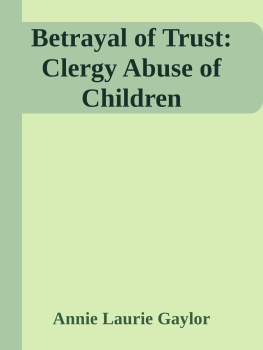
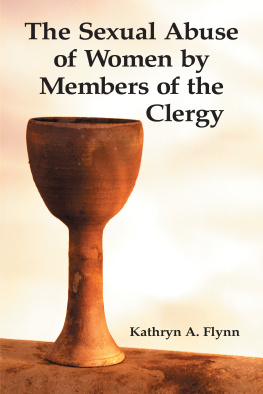
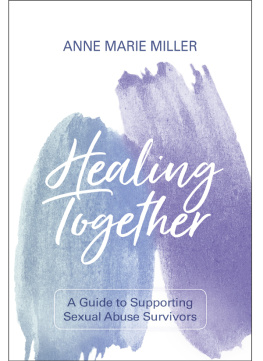
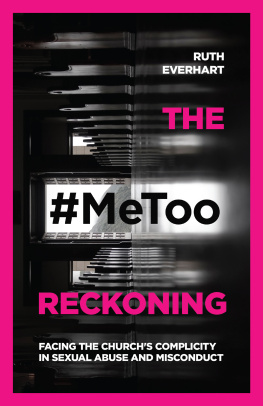
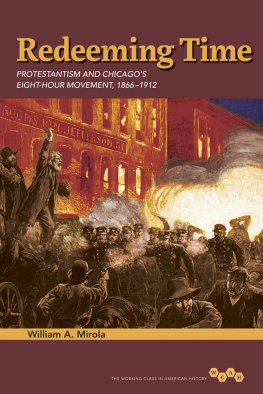




 This book is printed on acid-free paper.
This book is printed on acid-free paper.